高一高二高三英语必须掌握的十选九阅读讲解及巩固提升(二)
作者:未知 时间:2020-11-27 阅读:( )
备战高考2021年十选九阅读巩固提升练习"十选九"解题思路
一、词根的学习与记忆
词根是指在英语中的一些基本词,每个词根都代表一定的意思,是决定一个英语单词的意思的重要组成部分。以下简单列举一些使用较多的词根供同学参考:
词根 对应单词
1) aer(o)=air空气 . aerial空气的;aeroplane飞机
2) anim=life生命 animal动物;animate使……生机勃勃
3) annu(enni)=year年 anniversary周年纪念;annual年度的
4) astro(aster)=star星 astronaut宇航;astronomy天文学
5) audi(audit)=hear听 audience听众;audio-video视听的
6) aut(auto)=self自我 autograph亲笔;automobile汽车
7) bio'(bi)=life生命 biology生物学;biotic生命的、生物的
8) ced(ceed, cess)=go行走 precede领先;exceed超过;process过程
9) cert - certain确定的 certify证实;certificate证明书
10) circ - ring环形 circus马戏场;circle圆圈;circulate流通、流传
11) cred=believe相信 credible可信的;credulous轻信的;credit信任
12) cycl(o)=circle圆 cycle圆;bicycle自行车
13) dict - say说. dictation口述、听写;dictator独裁;predict预言
14) duct - lead领导 educate教育;introduce介绍
15) equ - equal相等的 equality平等;equivalent相等的;equator赤道
16) flu=flow流动 fluent流利的、流畅的;fluid液体(的)
17) geo - earth地 geography地理;geology地质学
18) gram - write, sth written写、画;文字、图形
grammar语法;diagram图表;telegram电报
19) graph=write; sth. written; instrument for making records写,面;文字图形;用于文字图形的仪器
photograph照片;telegraph电报机;graphics制图法
20) habit=dwell居住 habitant居住者;inhabit居住于
21) hal=breathe呼吸 inhale吸;exhale呼
22) hydro=water水 hydroelectric水电的;hydrology水文学
23) leg(legis)=law法 legal法律的;legislate立法
24) lingu=language语言 linguistic语言学;bilingual两种语言的;multilingual多语言的
25) liter - letter文字 literate识字的;literature文学;literal字面的
. 26) loc=place地方 local地方的;locate放置;dislocate脱位
27) log=speak说 dialogue对话;apology道歉;logic逻辑
28) metr - measuring测量 geometry几何;barometer气压计;出diameter直径
29) mim - small水 minify使缩小;minimum最小量;miniature微型物
30) nov - new新的 novel新奇的;小说;innovate创新;renovate革新
31) nutri=nourish营养 nutrition营养;malnutrition营养不良
32), pel=push推 propel推动;expel驱逐;repel反击
33) port - carry运 portable可携带的;import进口;porter搬运工
34) pos - put放 expose使暴露;compose编,创作;oppose反抗
35) pur - pure纯净的 purify净化;purity纯净;impurity不净
36) rect=right正、直 correct正确;rectify纠正
37) rupt - break破 interrupt打断;disrupt瓦解;erupt喷发
38) scend(s) - climb攀爬 ascend上升;descend下降;transcend超越
39) scrib(pt)=write写 describe描写;scripture手稿;subscribe订阅
40) sol=alone单独 solo独唱;solitary单独的;desolate荒凉的
41) son - sound声音 sonic声音的;resonant回声的
42) spir - breathe呼吸 conspire同谋;inspire鼓舞;expire终止
43) struct - build建造 structure结构;construct建造;destruction破坏
44) tele=far远 telescope望远镜;telegram电报;television电视
45) tract - draw拉 tractor拖拉机;attract吸引;contract合同
46) vis(vid)=see着 visible可见的;visit参观;advise建议;evident明显的
47) viv - live活 survive比……活得长;revive复活;vivid生动的
实战演练
Passage 1
There are many kinds of 1 for children today—books, movies, games and sports are only a few of possibilities. Television is one of the most influential kinds of entertainment. Studies show that elementary school children in the United States watch 2 about twenty-five hours a week.
Some people feel that television has had a good influence 3 children because it offers educational programs for them. One of the best and most 4 programs is Sesame Street(芝麻街). One study claims that Sesame Street 5 children do better in school. Many people hope that programs like this will provide a better education for children from poor communities and schools.
Other people feel that television is bad for children. They feel that there are too many programs about crime and violence, and that even educational programs don't help a child's education. Children 6 watch too much television, and therefore they don't do a lot of other things that are important to them. Preschool children need to speak their language and 7 with people. When they are watching television they are only listening to the language, they aren't communicating with anyone. When elementary school children watch television, they read a lot less. Because of this, they don't learn to read and write as quickly at school.
All children learn by doing, and they need time to play in order to learn 8 the world. When they watch television, they play 9 . They also have less time to develop relationship with their parents and friends, and they have less time to exercise and develop their bodies.
Passage 2
My grandfather grew up in war-torn Europe. When German soldiers occupied his hometown, the thriving city of Tarow, Poland, he refused to obey them and eventually1 the Soviet army to fight for his country's 2 . "Stand straight, stand tall," he told himself.
After the war, in 1947, he boarded a boat for Manhattan. He was hungry and suffering from seasickness. All alone in a new country, he was 3 about his future. Still, he marched head-on into the hustle and bustle of the streets of New York. Soon he met other European 4 , each of them trying to find his or her own way. If they could do it, why couldn't he? "Stand straight, stand tall," he would remind himself.
Thanks to the help of a loyal and trusting friend, my grandfather 5 a jewelry booth on Canal Street, New York City. He once told me how 6 he was on that first day of work. He was not only trying to learn this tough new business, but also a new language.
To his surprise, the men in neighboring booths—who could have taken advantage 7 him— offered their help and advice. Within months, my grandfather was commanding his spot 8 the counter, selling diamonds and cultured pearls as if he'd been doing it his whole life.
Stand straight and stand tall.
In later years, my grandfather would take both my mother and her sister down the aisle at their weddings. 9 he stood with each of them, he thought about their new beginnings, and of the adventures and journeys they would experience together. He also thought about the children who would one day carry on his family name.
I am so proud to be one of those children. Listening to my grandfather's remarkable experiences has changed the way I view my own life.
Passage 3
The decision to enter F1 and compete at the highest level of motor sport was an intended move by Toyota, the world's third 1 auto manufacturer, to further challenge its own capabilities. By going head-to-head with the industry's top performers on the world's premier racing stage, the Japanese giant was 2 itself a huge task. A sport with an enormous international following, the 3 of entering the F1 arena are high—but there are rich rewards for those who succeed. Besides being a showcase for state-of-the-art technology, the intense competition in this most demanding of racing disciplines leaves no room for self-satisfaction. More importantly, it fosters(培养)the kind of forward-thinking team spirit that Toyota is seeking.
While F1 benefited greatly from the added prestige of having such a distinguished newcomer among its 4 , the demands placed on Panasonic Toyota Racing last year revealed the shortcomings of not having enough experience as a team. Mistakes were made and 5 lessons were learned, among which was the fundamental truth: "To stand still in F1 is to go backwards."
With the past in mind, preparations for the 2003 season included 6 changes on both the 7 and personnel(人事的)sides. The management at Toyota Motorsport GmbH was restructured, 8 John Howett moving from Toyota Motor Marketing Europe to become President, thus enabling the company founder, Ove Andersson, more time to concentrate 9 the operation of the race team at the track. Andersson's value as an inspirational leader was one of the team's biggest assets (财富) in 2002.
Passage 4
Columbus, Ohio—The heart operation—taking place in the pale-green operating room at the Ohio State University Medical Center was 1 . The patient, a 62-year-old man, was made to sleep, tied with blue drapes(消毒帷帘)and lying face up on a narrow table. But no one was touching 2 .
Instead, the operation was being performed by a robot, whose three metal arms went through pencil-sized holes in the man's chest. At the ends of the robot's arms were tiny metal fingers, with 3 wrists, which held a tiny instrument, a light and a camera. The robot's arms and fingers were controlled by Dr. Randall K. Wolf, 4 at a computer in a corner of the operating room about 20 feet away.
This sort of operation, heart surgeons say, is the start of what may be the biggest change in 5 profession since heart bypass surgery(心脏搭桥手术)began nearly 30 years ago. "The reason we make cuts is that we have big hands," said Dr. Wolf, the 6 of the surgery at Ohio State. The robot's dainty fingers, no longer than a nail on the small finger, at the end of the long sticks could work better.
Eventually, surgeons believe, most heart surgery will be done by robots 7 arms are put in through pencil-sized holes punched in patients' chests. Instead of directly staring into a patient's body, surgeons will view 8 images of the operation on computer screens. In theory, the doctor would not have to be in the same room, or even the same country, as the 9 .
Passage5
Twenty years are just a blink in time. But twenty years is also long enough for a man to grow up. It is always painful. For Andre Agassi, maturing in the spotlight of international tennis 1 was even harder.
On September 3, the American tennis player said a 2 goodbye to his 21-year career after a third-round defeat in the US Open. The 36-year-old tried his best, but was unable to keep up with German Benjamin Becker, more than ten years his junior.
"The scoreboard said I lost today, but what the scoreboard doesn't say is what I've 3 ," Agassi said to the fans. "I have found inspiration and you willed me to succeed." It was an emotional speech at the end of a long career.
Agassi hated tennis as a 4 as much as he loves it now. His father made him play when he was a child. He got bored, and became a rebel(叛逆). The strict training that his father pushed upon him got in the way of his wild lifestyle. He grew hair long, wore 5 clothes and spat at an umpire. Over the years, he has made bad jokes 6 news conferences.
Asked what he would say to his 17-year-old self, Agassi answered, "I would say, I understand you a lot more than I want to be you."
The turning point in Agassi' s career 7 in 1992 when he unexpectedly won his first Grand Slam (大满贯赛事) at Wimbledon. It was the first time Agassi understood what real champions finally understand: winning is a test of nerves and not just power, it's a marathon, not a sprint.
And what a marathon Agassi was about to begin. He cut his long hair, got fitter and tightened up emotionally. On the court, he was ranked No. 1 for almost two years. His lowest point came in 1997 when his ranking dropped 8 No. 141. He didn't quit though. "I knew that I 9 try to get the most out of myself every day from that day forward. That was my commitment, "he said. "That never stopped."
Passage 6
But I wonder about my Momma 1 , and all the other negro mothers who got up at 6 a. m. to go to the white man's house 2 sacks over their shoes because it was so wet and cold. I wonder how they made it. They worked very hard for the man, they made his breakfast and they 3 his floors and they took care of his babies. They didn't have too much time for us.
I wonder about my Momma, who walked out of a white woman's clean house at midnight and came back to her own where the lights had been out for three months, and the pipes were 4 and the wind came in through the holes in the wall. She'd have to make deals with the rats: leave some food out for them so they wouldn't bite the doors or the babies. The roaches(蟑螂)? Oh, they were just like part of the family!
I wonder how she felt telling those white kids she took care of to brush their teeth after they ate, to wash their hands after they finish bathroom. She could 5 tell her own kids because there wasn't soap or water back home.
I wonder how my Momma felt when we came home from school with a list of vitamins and pills the school nurse said we had to have. Momma would cry all night, and then go out and spend most of the 6 money for pills. A week later, the white man would come for his eighteen dollars' rent and Momma would beg him to wait until tomorrow. She had to lie to 7 that she had lost her wallet or the relief check was coming soon or the white people had some money for her. Tomorrow I'd be hiding in the closet because there was only supposed to be two kids in the flat, and I could hear the rent man shout at my Momma and call her a cheat. And when he finally went away, Momma put the sacks 8 her shoes and went off to the rich white man's house to dress the rich white kids so their mother could take 9 to a special baby doctor.
Keys:
1. AIBHC JGFD
2. AHDJI BCGE
3. GIJDB CAEH
4. AGIBJ CDFE
5. IACBG JDHE
6. HCEBA FIGJ
奇速英语冬夏令营都在用心做教育,以中学英语必修词汇、阅读为目标,通过八天七夜的全封闭集训,最低记完初中三年1600个单词;最低记完高中三年3500个单词;实现涨分游学双收获!每批次家长群的真实心声就还是答案。金杯银杯离不开家长的好口碑!奇速英语从7个学生开始办营,到现在成都营千人规模,90%学员都是老生或老生转介绍!良好的特训效果均受广大学员及家长、权威英语教育专家、英语培训同行的一致赞誉,学员们通过“7天(36小时—48小时)奇速学会3年单词,英语阅读又快又准”,将“英语速成,奇速涨分”的效果体现得淋漓尽致。欢迎关注奇速英语官网了解课程加入学习,奇速英语将一直致力于改变和引领中国英语词汇和阅读教学。请让孩子参加本次学习,完成全部课程,孩子的词汇量至少提升2000+!除此之外,以上英语冬令营课程也可以在线学习,奇速英语小学在线课程、初中英语同步涨分课程(初一、初二、初三)、高中英语同步涨分课程(高一、高二)在线试听可以点击链接报名http://www.qisuen.cn/wx/user/account/elevenActivityIndex?fromer=21

(英语冬夏令营单词阅读课程扫码联系老师参与课程报名)
-
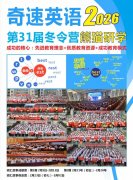
2026寒假高一英语冬令营河南驻马店、济源寒假英语培训班及奇速英语冬令营优势特色
(136)人喜欢 2026-01-20 -
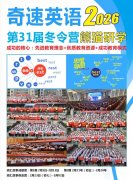
2026寒假高二英语冬令营如何选择,河南信阳、周口寒假英语培训班及奇速英语冬令营优势
(58)人喜欢 2026-01-20 -
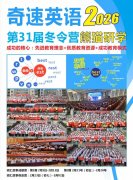
2026福建泉州初二.高二英语寒假冬令营哪个比较好、全国十大英语单词冬令营品牌推荐
(92)人喜欢 2026-01-15 -
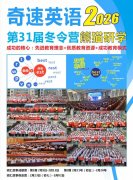
2026福建福州寒假高一冬令营令营哪个比较好、全国十大英语冬令营品牌奇速英语集训班推
(145)人喜欢 2026-01-15 -
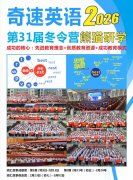
2026广东汕头市、佛山市寒假初一高一冬令营哪个机构好、英语集训营冬令营一次要多少费
(134)人喜欢 2026-01-15 -
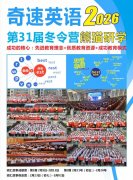
2026河北高一英语寒假冬令营哪家好?邢台、保定、廊坊、承德口碑好的奇速英语冬令营推
(210)人喜欢 2026-01-15 -

高三家长必看!这个寒假,帮孩子的高考英语再冲 20+!奇速英语高考专项冬令营紧急开营
(198)人喜欢 2025-11-26 -

寒假高一英语冬令营河南驻马店、济源寒假英语培训班及奇速英语冬令营优势特色
(89)人喜欢 2025-11-13 -
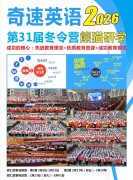
高二英语寒假冬令营如何选择,河南信阳、周口寒假英语培训班及奇速英语冬令营优势特色
(154)人喜欢 2025-11-13 -
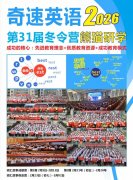
2026寒假高一英语冬令营河南驻马店、济源寒假英语培训班及奇速英语冬令营优势特色
(177)人喜欢 2025-11-05
时文精读与故事记单词,这是我用过的英语成绩提

暖冬筑梦,英启新章——奇速英语冬令营,让每个

暖冬筑梦,英启新章——奇速英语冬令营,让每个

不负暖冬,英你闪耀——奇速英语冬令营,解锁孩

不负暖冬,英你闪耀——奇速英语冬令营,解锁孩

不负暖冬,英你闪耀——奇速英语冬令营,解锁孩

不负暖冬,英你闪耀——奇速英语冬令营,解锁孩

不负暖冬,英你闪耀——奇速英语冬令营,解锁孩

不负暖冬,英你闪耀——奇速英语冬令营,解锁孩

不负暖冬,英你闪耀——奇速英语冬令营,解锁孩

不负暖冬,英你闪耀——奇速英语冬令营,解锁孩

不负暖冬,英你闪耀——奇速英语冬令营,解锁孩

不负暖冬,英你闪耀——奇速英语冬令营,解锁孩

暖冬启智,英领成长 —— 奇速英语冬令营,让孩

暖冬启智,英领成长 —— 奇速英语冬令营,让孩

寒假超车正当时,奇速英语冬令营让孩子与优秀并

冬藏锋芒,英绽新程 —— 奇速英语冬令营,解锁

冬藏锋芒,英绽新程 —— 奇速英语冬令营,解锁

冬藏锋芒,英绽新程 —— 奇速英语冬令营,解锁

寒假燃动英语力,奇速营启新征程 —— 奇速英语
